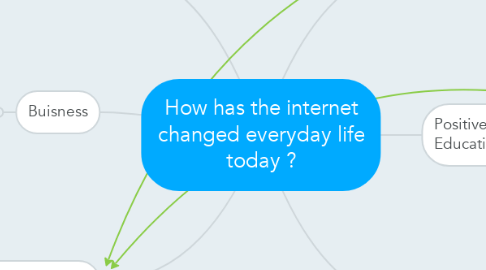How has the internet changed everyday life today ?
作者:Noah Ferran

1. Cyber Bullying
1.1. Cyber bullying is when someone uses technology and electronic devices to do mean things, such as start rumors, post embarrassing things on social media, or send inappropriate content or text messages meant to incite violence in some way .
1.2. These “bullies” use any kind of device they can to get the word out – computers, phones, tablets, chat rooms, through online gaming and social media sites.
1.3. The effects of cyberbullying may not be noticeable at first, but the stress factor builds up over time. Many students experiencing cyber bullying feel alone and scared.
2. Positive Effects on Education
2.1. Not only can students communicate with international students, they can gain from others' knowledge and experiences, participate in chatrooms, share ideas and solutions and learn about the many diverse cultures out there.
2.2. Teachers have the chance to be able to teach at more than one place simultaneously.
3. Activities
3.1. When was the last time you bought something online? If you are like many of us, it was probably in the last week or even the last hour. We can read reviews, research ratings, find the best price, and pay for an item without having to put on shoes.
3.2. The internet allows us to “talk,” without ever having to get on the phone. It seems as if our phones are simply around so we can avoid the people we don’t want to talk to, while texting and tweeting the ones we do. Old flames are connecting; families are communicating more; friends never have to go without seeing each other; and professional connections can flourish.
4. Negative Effects on Education
4.1. The Internet means no waiting and instant results with minimal effort. These traits don't translate to the classroom, where teachers expect students to work for their grades.
4.2. Everything about the Internet is fast. Web sites streamline information and deliver it in quick bursts, making it easy to digest and understand.This constant supply of available entertainment has reduced the average attention span.
4.3. Knowing that the correct answers are readily available online can prove far too tempting for some students, which leads to academic fraud, plagiarism, and rampant cheating.
5. Buisness
5.1. If a business emergency arose during off-hours, getting a snap decision from management was difficult. Today, business owners and employees can stay in touch with email, instant messaging and face-to-face chat over the Internet.
5.2. With faster communication, more work can be done on a shorter timescale thanks to the Internet. Seminars, meetings and workshops can be taken online via Skype and other interactive streaming video applications. Internet-enabled whiteboards allow business teams in different cities to work on projects as if they were in the same room together.
6. Communication
6.1. While some may argue that the internet and social media has caused us to be more unsociable, taking us away from the physical world and hiding behind a screen, others believe that it has enhanced our relationships with people.
6.2. With so many different ways of communicating, it could be argued that the internet has just increased the overall frequency of communication, allowing us to stay in touch and make social plans with people we already know face to face.
6.3. However, the internet has also allowed many people to form completely new relationships with people they never knew and never would have met face-to-face. For instance, the growth of online dating has rocketed .


